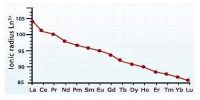Alfred Werner (1866-1919) French born Swiss chemist founded the modern theory on coordination compounds. His theory and pioneering experimental work on metal complexes won for him the Nobel Prize for chemistry in 1913. Werner was the first inorganic chemist to be awarded the nobel prize in chemistry. He is considered at “Father of coordination chemistry”.
Werner’s representation
Werner represented the first member of the series [Co(NH3)6]Cl3 as follows. In this representation, the primary valency (dotted lines) are satisfied by the three chloride ions. The six secondary valencies (solid lines) are satisfied by the six ammonia molecules.

Defects of Werner’s theory
Werner’s theory describes the structures of many coordination compounds successfully. However, it does not explain the magnetic and spectral properties.













